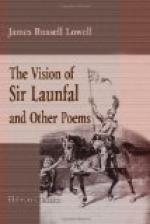Swiftly
the present fades in memory’s glow,—
Our only sure
possession is the past;
The
village blacksmith died a month ago,
And dim to me
the forge’s roaring blast; 235
Soon
fire-new medievals we shall see
Oust
the black smithy from its chestnut-tree,
And that hewn down, perhaps,
the bee-hive green and vast.
How
many times, prouder than king on throne,
Loosed from the
village school-dame’s A’s and B’s,
240
Panting
have I the creaky bellows blown,
And watched the
pent volcano’s red increase,
Then
paused to see the ponderous sledge, brought down
By
that hard arm voluminous and brown,
From the white iron swarm
its golden vanishing bees. 245
Dear
native town! whose choking elms each year
With eddying dust
before their time turn gray,
Pining
for rain,—to me thy dust is dear;
It glorifies the
eve of summer day,
And
when the westering sun half sunken burns,
250
The
mote-thick air to deepest orange turns,
The westward horseman rides
through clouds of gold away.
So
palpable, I’ve seen those unshorn few,
The six old willows
at the causey’s end
(Such
trees Paul Potter never dreamed nor drew), 255
Through this dry
mist their checkering shadows send,
Striped,
here and there, with many a long-drawn thread,
Where
streamed through leafy chinks the trembling red,
Past which, in one bright
trail, the hang-bird’s flashes blend.
Yes,
dearer far thy dust than all that e’er,
260
Beneath the awarded
crown of victory,
Gilded
the blown Olympic charioteer;
Though lightly
prized the ribboned parchments three,
Yet
collegisse juvat, I am glad
That
here what colleging was mine I had,—
265
It linked another tie, dear
native town, with thee!
Nearer
art thou than simply native earth,
My dust with thine
concedes a deeper tie;
A
closer claim thy soil may well put forth,
Something of kindred
more than sympathy; 270
For
in thy bounds I reverently laid away
That
blinding anguish of forsaken clay,
That title I seemed to have
in earth and sea and sky.
That
portion of my life more choice to me
(Though brief,
yet in itself so round and whole) 275
Than
all the imperfect residue can be;—
The Artist saw
his statue of the soul
Was
perfect; so, with one regretful stroke,
The
earthen model into fragments broke,
And without her the impoverished
seasons roll. 280




